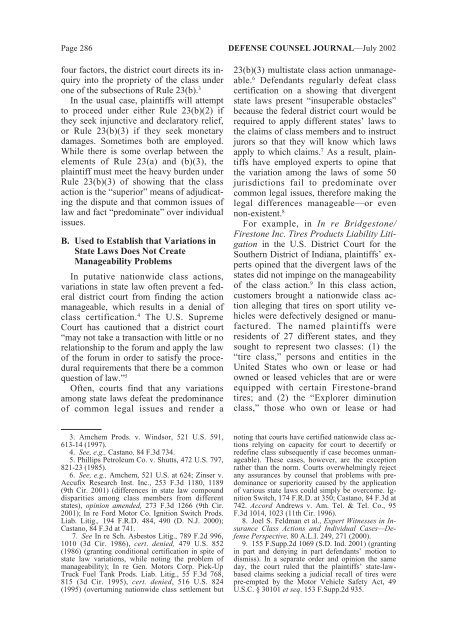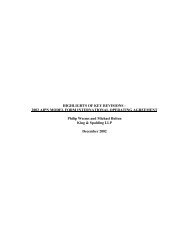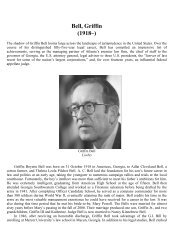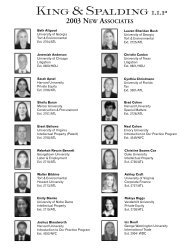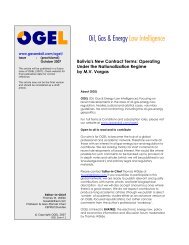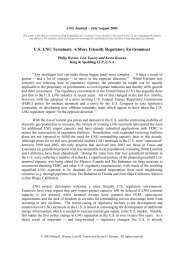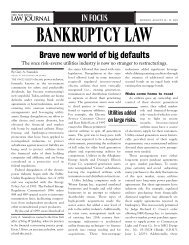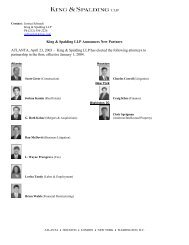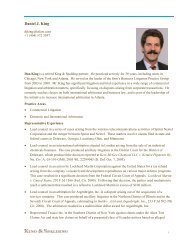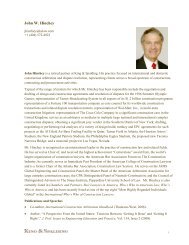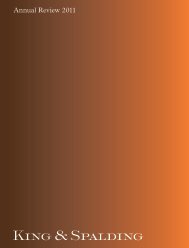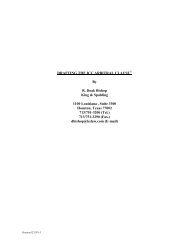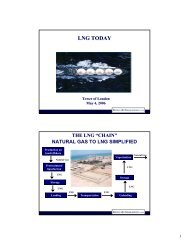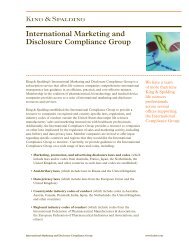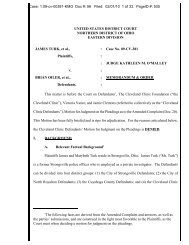Use and Misuse of Expert Opinions at the Class ... - King & Spalding
Use and Misuse of Expert Opinions at the Class ... - King & Spalding
Use and Misuse of Expert Opinions at the Class ... - King & Spalding
You also want an ePaper? Increase the reach of your titles
YUMPU automatically turns print PDFs into web optimized ePapers that Google loves.
Page 286 DEFENSE COUNSEL JOURNAL—July 2002<br />
four factors, <strong>the</strong> district court directs its inquiry<br />
into <strong>the</strong> propriety <strong>of</strong> <strong>the</strong> class under<br />
one <strong>of</strong> <strong>the</strong> subsections <strong>of</strong> Rule 23(b). 3<br />
In <strong>the</strong> usual case, plaintiffs will <strong>at</strong>tempt<br />
to proceed under ei<strong>the</strong>r Rule 23(b)(2) if<br />
<strong>the</strong>y seek injunctive <strong>and</strong> declar<strong>at</strong>ory relief,<br />
or Rule 23(b)(3) if <strong>the</strong>y seek monetary<br />
damages. Sometimes both are employed.<br />
While <strong>the</strong>re is some overlap between <strong>the</strong><br />
elements <strong>of</strong> Rule 23(a) <strong>and</strong> (b)(3), <strong>the</strong><br />
plaintiff must meet <strong>the</strong> heavy burden under<br />
Rule 23(b)(3) <strong>of</strong> showing th<strong>at</strong> <strong>the</strong> class<br />
action is <strong>the</strong> “superior” means <strong>of</strong> adjudic<strong>at</strong>ing<br />
<strong>the</strong> dispute <strong>and</strong> th<strong>at</strong> common issues <strong>of</strong><br />
law <strong>and</strong> fact “predomin<strong>at</strong>e” over individual<br />
issues.<br />
B. <strong>Use</strong>d to Establish th<strong>at</strong> Vari<strong>at</strong>ions in<br />
St<strong>at</strong>e Laws Does Not Cre<strong>at</strong>e<br />
Manageability Problems<br />
In put<strong>at</strong>ive n<strong>at</strong>ionwide class actions,<br />
vari<strong>at</strong>ions in st<strong>at</strong>e law <strong>of</strong>ten prevent a federal<br />
district court from finding <strong>the</strong> action<br />
manageable, which results in a denial <strong>of</strong><br />
class certific<strong>at</strong>ion. 4 The U.S. Supreme<br />
Court has cautioned th<strong>at</strong> a district court<br />
“may not take a transaction with little or no<br />
rel<strong>at</strong>ionship to <strong>the</strong> forum <strong>and</strong> apply <strong>the</strong> law<br />
<strong>of</strong> <strong>the</strong> forum in order to s<strong>at</strong>isfy <strong>the</strong> procedural<br />
requirements th<strong>at</strong> <strong>the</strong>re be a common<br />
question <strong>of</strong> law.” 5<br />
Often, courts find th<strong>at</strong> any vari<strong>at</strong>ions<br />
among st<strong>at</strong>e laws defe<strong>at</strong> <strong>the</strong> predominance<br />
<strong>of</strong> common legal issues <strong>and</strong> render a<br />
23(b)(3) multist<strong>at</strong>e class action unmanageable.<br />
6 Defendants regularly defe<strong>at</strong> class<br />
certific<strong>at</strong>ion on a showing th<strong>at</strong> divergent<br />
st<strong>at</strong>e laws present “insuperable obstacles”<br />
because <strong>the</strong> federal district court would be<br />
required to apply different st<strong>at</strong>es’ laws to<br />
<strong>the</strong> claims <strong>of</strong> class members <strong>and</strong> to instruct<br />
jurors so th<strong>at</strong> <strong>the</strong>y will know which laws<br />
apply to which claims. 7 As a result, plaintiffs<br />
have employed experts to opine th<strong>at</strong><br />
<strong>the</strong> vari<strong>at</strong>ion among <strong>the</strong> laws <strong>of</strong> some 50<br />
jurisdictions fail to predomin<strong>at</strong>e over<br />
common legal issues, <strong>the</strong>refore making <strong>the</strong><br />
legal differences manageable—or even<br />
non-existent. 8<br />
For example, in In re Bridgestone/<br />
Firestone Inc. Tires Products Liability Litig<strong>at</strong>ion<br />
in <strong>the</strong> U.S. District Court for <strong>the</strong><br />
Sou<strong>the</strong>rn District <strong>of</strong> Indiana, plaintiffs’ experts<br />
opined th<strong>at</strong> <strong>the</strong> divergent laws <strong>of</strong> <strong>the</strong><br />
st<strong>at</strong>es did not impinge on <strong>the</strong> manageability<br />
<strong>of</strong> <strong>the</strong> class action. 9 In this class action,<br />
customers brought a n<strong>at</strong>ionwide class action<br />
alleging th<strong>at</strong> tires on sport utility vehicles<br />
were defectively designed or manufactured.<br />
The named plaintiffs were<br />
residents <strong>of</strong> 27 different st<strong>at</strong>es, <strong>and</strong> <strong>the</strong>y<br />
sought to represent two classes: (1) <strong>the</strong><br />
“tire class,” persons <strong>and</strong> entities in <strong>the</strong><br />
United St<strong>at</strong>es who own or lease or had<br />
owned or leased vehicles th<strong>at</strong> are or were<br />
equipped with certain Firestone-br<strong>and</strong><br />
tires; <strong>and</strong> (2) <strong>the</strong> “Explorer diminution<br />
class,” those who own or lease or had<br />
3. Amchem Prods. v. Windsor, 521 U.S. 591,<br />
613-14 (1997).<br />
4. See, e.g., Castano, 84 F.3d 734.<br />
5. Phillips Petroleum Co. v. Shutts, 472 U.S. 797,<br />
821-23 (1985).<br />
6. See, e.g., Amchem, 521 U.S. <strong>at</strong> 624; Zinser v.<br />
Accufix Research Inst. Inc., 253 F.3d 1180, 1189<br />
(9th Cir. 2001) (differences in st<strong>at</strong>e law compound<br />
disparities among class members from different<br />
st<strong>at</strong>es), opinion amended, 273 F.3d 1266 (9th Cir.<br />
2001); In re Ford Motor Co. Ignition Switch Prods.<br />
Liab. Litig., 194 F.R.D. 484, 490 (D. N.J. 2000);<br />
Castano, 84 F.3d <strong>at</strong> 741.<br />
7. See In re Sch. Asbestos Litig., 789 F.2d 996,<br />
1010 (3d Cir. 1986), cert. denied, 479 U.S. 852<br />
(1986) (granting conditional certific<strong>at</strong>ion in spite <strong>of</strong><br />
st<strong>at</strong>e law vari<strong>at</strong>ions, while noting <strong>the</strong> problem <strong>of</strong><br />
manageability); In re Gen. Motors Corp. Pick-Up<br />
Truck Fuel Tank Prods. Liab. Litig., 55 F.3d 768,<br />
815 (3d Cir. 1995), cert. denied, 516 U.S. 824<br />
(1995) (overturning n<strong>at</strong>ionwide class settlement but<br />
noting th<strong>at</strong> courts have certified n<strong>at</strong>ionwide class actions<br />
relying on capacity for court to decertify or<br />
redefine class subsequently if case becomes unmanageable).<br />
These cases, however, are <strong>the</strong> exception<br />
r<strong>at</strong>her than <strong>the</strong> norm. Courts overwhelmingly reject<br />
any assurances by counsel th<strong>at</strong> problems with predominance<br />
or superiority caused by <strong>the</strong> applic<strong>at</strong>ion<br />
<strong>of</strong> various st<strong>at</strong>e laws could simply be overcome. Ignition<br />
Switch, 174 F.R.D. <strong>at</strong> 350; Castano, 84 F.3d <strong>at</strong><br />
742. Accord Andrews v. Am. Tel. & Tel. Co., 95<br />
F.3d 1014, 1023 (11th Cir. 1996).<br />
8. Joel S. Feldman et al., <strong>Expert</strong> Witnesses in Insurance<br />
<strong>Class</strong> Actions <strong>and</strong> Individual Cases—Defense<br />
Perspective, 80 A.L.I. 249, 271 (2000).<br />
9. 155 F.Supp.2d 1069 (S.D. Ind. 2001) (granting<br />
in part <strong>and</strong> denying in part defendants’ motion to<br />
dismiss). In a separ<strong>at</strong>e order <strong>and</strong> opinion <strong>the</strong> same<br />
day, <strong>the</strong> court ruled th<strong>at</strong> <strong>the</strong> plaintiffs’ st<strong>at</strong>e-lawbased<br />
claims seeking a judicial recall <strong>of</strong> tires were<br />
pre-empted by <strong>the</strong> Motor Vehicle Safety Act, 49<br />
U.S.C. § 30101 et seq. 153 F.Supp.2d 935.


